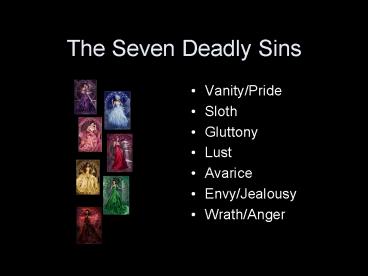The Seven Deadly Sins - PowerPoint PPT Presentation
1 / 27
Title:
The Seven Deadly Sins
Description:
Act 1, Scene 3 If thou canst cuckold him, thou dost thyself a pleasure Act 1, Scene 3 Avarice/Greed Avarice/Greed Avarice is the desire for material gain. – PowerPoint PPT presentation
Number of Views:281
Avg rating:3.0/5.0
Title: The Seven Deadly Sins
1
The Seven Deadly Sins
- Vanity/Pride
- Sloth
- Gluttony
- Lust
- Avarice
- Envy/Jealousy
- Wrath/Anger
2
Vanity/Pride
3
Vanity/Pride
- Excessive belief in ones own abilities or
excessive love of oneself. - Othello commits the sin of pride in that he
cannot conceive of anyone being disloyal to him
and is therefore easily manipulated by Iago. - Part of the reason Othello kills Desdemona is to
restore his pride after being cuckolded.
4
Vanity/Pride
- But he, as loving his own pride and
purposenon-suits my mediators. Act 1, Scene 1 - But, alas, to make me the fixed figure for the
time of scorn to point his slow unmoving finger
at. Act 4, Scene 2
5
Vanity/Pride
- Punishment for the deadly sin of pride was to be
broken on the wheel - laced on a cartwheel with
limbs stretched out along the spokes. The wheel
revolved slowly and a large iron bar was then
applied to the limb over the gap between the
beams, breaking the bones
6
Sloth
7
Sloth
- Sloth is apathy - not caring about others or
living life in a fulfilling way. - When one is apathetic they do not help their
fellow people and this affects their spiritual
well-being. - An slothful person commits no good deeds.
- In Othello the storms destruction of the Turkish
fleet leaves the group idle and therefore prone
to trouble and open to manipulation by Iago.
8
Sloth
- The deadly sin of sloth was punished by being
thrown into snake pits.
9
Gluttony
10
Gluttony
- The consumption of more of anything than you
need. - Not just confined to food - can also include
resources and excess materialism. - Cassios problem with alcohol and the fights that
follow excessive drinking in Othello can be seen
as a warning from Shakespeare against gluttony.
11
Gluttony
- Lets teach ourselves that honourable stop, not
to outsport discretion. Act 2, Scene 3 - The very elements of this warlike isle, have I
tonight flusterd with flowing cups. Act 2,
Scene 3
12
Gluttony
- The deadly sin of gluttony was punished by being
forced in the afterlife to eat rats, toads and
snakes.
13
Lust
14
Lust
- In Othello, Roderigo is so consumed by lust for
Desdemona that he is easily manipulated by Iago. - Iago constantly tries to debase Othellos and
Desdemonas relationship by inferring that it is
based on lust.
15
Lust
- When the blood is made dull with the act of
sport Act 2, Scene 1 - When she is sated with his body she will find
the error of her choice. Act 1, Scene 3 - If thou canst cuckold him, thou dost thyself a
pleasure Act 1, Scene 3
16
Avarice/Greed
17
Avarice/Greed
- Avarice is the desire for material gain.
- It is similar to gluttony but possession rather
than consumption is the key. - Iago can be considered to commit the sin of
avarice when he uses Roderigo for his money. He
abuses Roderigos friendship for financial gain.
18
Avarice/Greed
- Thou, Iago, who hast had my purse as if the
strings were thine Act 1, Scene 1 - Thus do I ever make my fool my purse. Act 1,
Scene 3
19
Avarice/Greed
- The deadly sin of greed was punished by being
boiled alive in oil for all of eternity.
20
Envy/Jealousy
21
Envy/Jealousy
- Envy is the desire to possess what others have,
whether it be material objects, like cars or
character traits, like beauty, patience, etc. - Jealousy relates to the fear that someone has
something that belongs to you. - In Othello, Iago is envious of Cassios position
as lieutenant, Roderigo is envious of Othellos
marriage to Desdemona. - Iago claims to believe that Othello has slept
with Emilia and this jealousy is part of his
reason for hating Othello. - Iago suggests to Othello that Desdemona and
Cassio are having an affair and therefore
destroys him with his own jealousy.
22
Envy/Jealousy
- He, in good time, must his lieutenant be, and
Ihis Moorships ancient. Act 1, Scene 1 - I do suspect the lusty Moor hath leapd into my
seat, the thought whereof doth like a poisonous
mineral gnaw my inwards Act 2, Scene 2 - yet that I put the Moor at least into a
jealousy so strong that judgment cannot cure.
Act 2, Scene 2 - O beware, my lord, of jealousy it is the
green-eyed monster which doth mock the meat it
feeds on. Act 3, Scene 3
23
Envy/Jealousy
- Punishment for committing the deadly sin of envy
was to be immersed in freezing water for all
eternity.
24
Wrath/Anger
25
Wrath/Anger
- Choosing violent and hateful actions over love
and patience. - Desire to seek revenge outside the workings of
the justice system. - Suicide was considered a form of wrath as it was
seen as extreme anger at oneself. - In the play, Othello orders the death of Cassio
and kills Desdemona out of rage at her perceived
infidelity. He then kills himself upon realising
that he has been utterly deceived by Iago.
26
Wrath/Anger
- Thou hadst been better have been born a dog?
than answer my wak'd wrath. Act 3, Scene 3 - O that the slave had forty thousand lives! One
is too poor, too weak for my revenge. Act 3,
Scene 3 - Arise, black vengeance, from thy hollow cell!
Act 3, Scene 3
27
Wrath/Anger
- Punishment for the deadly sin of wrath was being
dismembered alive.































